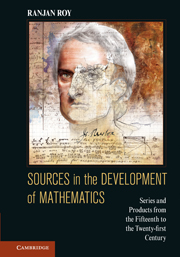 Sources in the Development of Mathematics
Sources in the Development of Mathematics Book contents
- Frontmatter
- Contents
- Preface
- 1 Power Series in Fifteenth-Century Kerala
- 2 Sums of Powers of Integers
- 3 Infinite Product of Wallis
- 4 The Binomial Theorem
- 5 The Rectification of Curves
- 6 Inequalities
- 7 Geometric Calculus
- 8 The Calculus of Newton and Leibniz
- 9 De Analysi per Aequationes Infinitas
- 10 Finite Differences: Interpolation and Quadrature
- 11 Series Transformation by Finite Differences
- 12 The Taylor Series
- 13 Integration of Rational Functions
- 14 Difference Equations
- 15 Differential Equations
- 16 Series and Products for Elementary Functions
- 17 Solution of Equations by Radicals
- 18 Symmetric Functions
- 19 Calculus of Several Variables
- 20 Algebraic Analysis: The Calculus of Operations
- 21 Fourier Series
- 22 Trigonometric Series after 1830
- 23 The Gamma Function
- 24 The Asymptotic Series for ln Γ(x)
- 25 The Euler–Maclaurin Summation Formula
- 26 L-Series
- 27 The Hypergeometric Series
- 28 Orthogonal Polynomials
- 29 q-Series
- 30 Partitions
- 31 q-Series and q-Orthogonal Polynomials
- 32 Primes in Arithmetic Progressions
- 33 Distribution of Primes: Early Results
- 34 Invariant Theory: Cayley and Sylvester
- 35 Summability
- 36 Elliptic Functions: Eighteenth Century
- 37 Elliptic Functions: Nineteenth Century
- 38 Irrational and Transcendental Numbers
- 39 Value Distribution Theory
- 40 Univalent Functions
- 41 Finite Fields
- References
- Index
23 - The Gamma Function
Published online by Cambridge University Press: 05 June 2012
- Frontmatter
- Contents
- Preface
- 1 Power Series in Fifteenth-Century Kerala
- 2 Sums of Powers of Integers
- 3 Infinite Product of Wallis
- 4 The Binomial Theorem
- 5 The Rectification of Curves
- 6 Inequalities
- 7 Geometric Calculus
- 8 The Calculus of Newton and Leibniz
- 9 De Analysi per Aequationes Infinitas
- 10 Finite Differences: Interpolation and Quadrature
- 11 Series Transformation by Finite Differences
- 12 The Taylor Series
- 13 Integration of Rational Functions
- 14 Difference Equations
- 15 Differential Equations
- 16 Series and Products for Elementary Functions
- 17 Solution of Equations by Radicals
- 18 Symmetric Functions
- 19 Calculus of Several Variables
- 20 Algebraic Analysis: The Calculus of Operations
- 21 Fourier Series
- 22 Trigonometric Series after 1830
- 23 The Gamma Function
- 24 The Asymptotic Series for ln Γ(x)
- 25 The Euler–Maclaurin Summation Formula
- 26 L-Series
- 27 The Hypergeometric Series
- 28 Orthogonal Polynomials
- 29 q-Series
- 30 Partitions
- 31 q-Series and q-Orthogonal Polynomials
- 32 Primes in Arithmetic Progressions
- 33 Distribution of Primes: Early Results
- 34 Invariant Theory: Cayley and Sylvester
- 35 Summability
- 36 Elliptic Functions: Eighteenth Century
- 37 Elliptic Functions: Nineteenth Century
- 38 Irrational and Transcendental Numbers
- 39 Value Distribution Theory
- 40 Univalent Functions
- 41 Finite Fields
- References
- Index
Summary
Preliminary Remarks
The problem of interpolating the sequence of factorials 0!, 1!, 2!, 3!, … appeared in Wallis's 1655 book on the quadrature of a circle. Specifically, the problem would be to find a function f(x) of a positive real variable x, such that f (x + 1) = x f (x) and f (n) = (n - 1)!, when n is a positive integer. One might wish to have f(n) = n! but we will identify f (x) with the gamma function Γ(x), so we shift the function f(n) = n! to the right by a unit. In his book, Wallis solved this problem for half-integral values of x but did not work out the details of the general case. Strangely, for seventy years after this, mathematicians did not take up this subject.
Euler and Stirling made significant contributions to this problem starting in the late 1720s. They worked independently, Euler in Russia and Stirling in Scotland; their approaches and aims were also distinct. In the mid-1730s, they came to know of each other's work and had a brief correspondence. Always the algorist, Euler was interested in obtaining analytic expressions for the interpolating function f(x). His first paper on the subject, written in 1730, gives two different representations of f(x), one as an infinite product and the other as a definite integral. On the other hand, Stirling was a numerical analyst interested in finding efficient methods for computing f(x).
Information
- Type
- Chapter
- Information
- Sources in the Development of MathematicsSeries and Products from the Fifteenth to the Twenty-first Century, pp. 444 - 475Publisher: Cambridge University PressPrint publication year: 2011